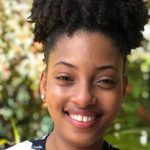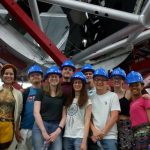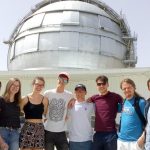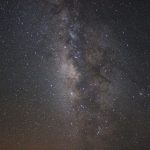OECS YES In Action highlights Cheyenne Polius
 Saint Lucian Astrophysics student challenging the status quo in the region
Saint Lucian Astrophysics student challenging the status quo in the region
This month, OECS YES In Action caught up with Cheyenne K. Polius, a 21 year old Saint Lucian Physics and Astrophysics Masters student effecting change in her homeland and encouraging her peers to get involved!
Tell us a little about yourself.
I have just completed my 3rd year of a 4-year Integrated Masters in Physics and Astrophysics at the University of Sheffield in England. I enjoy unravelling the mysteries of the universe through my degree and other forms of entertainment outside my course i.e. reading, watching YouTube videos and documentaries. However, if you sat down to have a conversation with me, my face would light up of you asked me about Space, fitness, procrastination, dogs or pretty much anything!
I enjoy having meaningful conversations where I get to share my knowledge and learn something new in the process. My constant desire to learn new things has accelerated my personal and professional growth as I am always looking for new ways to improve all the aspects of my life. This has helped me tremendously both in and out of school as it has led me to many exciting opportunities, some of which I have spoken about in my other responses.
When did you first notice your inclination towards Astronomy and Physics?
I have always been curious about how the world around me works. I remember spending hours watching documentaries on the Discovery and National Geographic channels. The more I learnt, the more I wanted to know. I enjoyed watching documentaries about nature because they always satisfied my curiosity when it came to wildlife, marine life and even human life. However, documentaries about Outer Space were my favourite because they always left me more curious than before. I would learn new things about the vast universe we live in but it always ended with a mystery since there is so much yet to be discovered about Space. It left me with a unique feeling of satisfaction that I had learnt some new things about Space but that satisfaction was mixed with excitement and curiosity because there was so much more to find out.
So, I knew Outer Space excited me the most but I did not know what that meant for me until Form 3. I did a Physics project about different scientists and one of them was Galileo Galilei. My research showed that, among other things, Galileo was an Astronomer and a Physicist. Eventually I came across the term, “Astrophysics” and that’s when it clicked. Physics is used to explain everything happening in Space! I spent the rest of the night researching “Astrophysics” and I discovered that there were degrees in it. There was that feeling again. From then I decided I wanted to study Astrophysics with hope that I would finally satisfy my curiosity about the wonders of the universe.
What were you doing before you began your studies?
I was lucky enough to go university directly after completing tertiary education so, up until then, I was at school feeding my passion for Science and Mathematics. I studied Chemistry, Biology and Physics at the St. Joseph’s Convent Secondary School and moved on to do Chemistry, Pure Mathematics and Physics at the Sir Arthur Lewis Community College.
University was always on my To-Do list for my life. I set the bar high for myself at a very young age and I have just been working towards the goal of completing university. I am grateful that I discovered my passion in time to start my degree without having to take a gap in my studies.
What obstacles, if any, did you face at the start and how did you overcome them?
I had to move from St. Lucia to England to start my university journey and I was VERY excited. Reality did not hit until I went to my first lecture. I was in a new school, in a new country with no friends and no idea how to make friends (or so I thought). I had always been shy and introverted but I never had a problem making friends in my small classrooms in St. Lucia. Something about a big lecture theatre with hundreds of students made me very anxious and afraid to talk to any and everyone. But I knew I did not want to be a loner throughout my time at university.
I researched things like “How to make friends” and “How to get over social anxiety”. It may seem silly but I felt hopeless for months. However, I did not let it stop me from doing the things I loved. I took part in extra-curricular activities and then I got my first part-time job at the beginning of my second year. Through this, I built connections with other students from all over the university. That is when I thought “if I can make friends outside my classes, I can do the same with people in my classes, right?” So, I took a leap of faith and just talked to people.
It started out as simply smiling and saying hello when I saw people I recognised. Eventually, that bloomed into conversations and before I knew it, I had made so many new friends! It sounds so simple but that is the thing about social anxiety: it stems from a place of irrational fear. So how did I overcome it? I stopped overthinking it and began actively reassuring myself. I kept mentally repeating things like “I’m good enough” and “I’m fun to be around” because that was the truth, I just needed to believe it.
The change did not happen overnight. It took months of daily reassurance but it happened. When I reflect on that time in my life, I realised that the only thing that changed was my attitude towards socialising. The whole time, the answer was within me.
Tell us about the journey from the first spark of interest to where you are currently.
It has not been easy but it has been worth it. I decided I wanted to pursue Astrophysics for the first time when I was 15 and I did not change my mind until my first few weeks at university. One of my classmates got an amateur telescope as his Christmas present and he was so excited about it. As much as I was interested in Space, I never wanted a telescope and I did not know how to identify any of the constellations. I felt like a fake.
I went to my personal tutor and I told him exactly that and asked him if the course was right for me. He asked me, “Do you enjoy your modules?”. I said that I only enjoyed some of them and there were some I hated, which made me feel even worse. His next words have stuck with me since that meeting 3 years ago. He told me that no one enjoys every single topic in their field of study and that I should give it some more time before I decide if the course was right for me.
By the end of first year, nothing could make me drop out! I was loving it! As for the guy and his telescope, my tutor reassured me by telling me that there were many lecturers in my department who were just like me: “Some people don’t fuss about looking up at the sky, they just like the science behind how things in the universe work”. All this to say that I’ve had moments of doubt. This was one of many instances that I’ve doubted if Astrophysics was right for me.
Most, if not all my doubt, stemmed from comparing myself to other people. It took me a while to realise that everyone is living their life based on their unique timeline. Once I realised that my best was enough, my university journey became so much more enjoyable. I kept working hard and kept myself busy through a range of extracurricular activities and part-time jobs. Collectively, these experiences and part-time jobs have led me to another passion: Science Communication.
The only thing I enjoy as much as Physics and Astrophysics is telling people about Physics and Astrophysics. Because of this, I chose to do one of my 3rd year projects in Physics Education and Outreach. This project taught me Science Communication knowledge and skills such as video-making. We were also encouraged to participate in Science Outreach events which is where I discovered my zeal for sharing my love for Science. Developing a love for Science Communication ties in perfectly with my role as National Point of Contact for St. Lucia in the Space Generation Advisory Council (discussed more in an upcoming response).
What would you consider to be your biggest challenge along the way?
My biggest challenge has definitely been the financial demands of my degree. This has been the most difficult because it is something that is out of my control. If I get a bad grade, I can find out what I did wrong and do better next time. If my room is messy, I can dust and put things where they should be to make it tidy. But money feels like the only thing that I do not have full control over and at times, it has adversely affected my mental health. I try to see everything from a positive perspective and I see this chapter in my life as another point for growth.
Life will not always be smooth sailing and getting through the low points in my life has made me so much stronger. I have also been blessed with parents and loved ones who are willing to support me financially and I will never be able to thank them enough. I have taken up as many part-time and temporary jobs as I can balance with my workload. This has helped ease some of the pressure and I am thankful to have gotten this far in my degree.
With everything else in my life, I am taking it one step and a time and keeping the faith that with hard work and determination, I will get where I need to be.
Is there an achievement or contribution that you are most proud of?
I am most proud of being an active National Point of Contact (NPoC) in the Space Generation Advisory Council (SGAC). The Space Generation Advisory Council is a global organisation that aims to give the next generation of space sector leaders a voice in global space policy. The council wants to create a global volunteer base of university students and young professionals in the space sector who have a passion for making a difference in the space sector and a commitment to action. My role as NPoC is to serve as the communication channel between St. Lucia and the council.
The Caribbean region is not currently active in the space sector and I believe the benefits are not obvious when considering economic growth of the region. So, in a nutshell, I am using my capacity to raise awareness of such benefits and to open the minds of youth in my island to the countless careers available in the Space Sector and other Science, Technology, Engineering and Mathematics (STEM) fields.
It was very discouraging at the beginning since I believed that no one would be interested in getting involved in SGAC. It would have been easy to give up since I emailed a number of schools to tell them about the council and my goals for St. Lucia and I only got one response. I believe this was partly because the importance of my role was not recognised but also because I was limited to sending emails since I live the UK. I knew communication would be a lot more effective in person or at least over the phone but I made use of what I had at the time. I kept trying and I am happy to say that the movement is finally gaining some traction in St Lucia.
Spending this summer on the island, I was able to meet with the Science & Technology Officer at the Department of Sustainable Development to get my message out there. This led me to giving my first talk on behalf of SGAC to a group of students at a Science and Robotics Camp in Vieux Fort.
The information I gave about the SGAC and the benefits of Astronomy to the Caribbean region was well-received. Since then, I have reached a wider audience through social media and several young people have contacted me expressing their interest in the SGAC. I am overwhelmed by the interest and I am glad I chose not to give up. I am excited to see how the SGAC movement will grow in St Lucia and I hope it will cause a ripple effect throughout the Caribbean.
What would you say most motivates you to do what you do?
What gets me excited every day is being able to inspire people to do what they are most passionate about and to help those who have not found that passion yet. When I chose to study Physics and Astrophysics, I did not know anyone who worked in the field. My teachers gave me valuable insight into doing a Science degree but not into what it would be like to be an Astrophysicist or someone working in the Physics industry.
If I was not so determined to pursue Astrophysics, the fact that no one around me had done it before could have made me change my mind and choose a career that was more popular for a sense of security. So, I want to be a role model for anyone thinking of pursuing Physics, Astrophysics or any other career that is out-of-the-box. Knowing that my journey can inspire someone to follow their dreams is what keeps me most motivated.
What are the goals you most want to accomplish in your area of study?
The area of my degree that has interested me the most is the search for extra-terrestrial life. It is the popular belief among researchers that there is life elsewhere in the universe and contributing to its discovery would be rewarding. However, my main goal is to increase gender and ethnic diversity in Physics.
Physics is a male-dominated field. It is also a field where people of colour are in the minority. In my capacity, as National Point of Contact, I hope to start the foundation for achieving this goal as it is something I will continue to work towards as long as I am in the Science field.
Did you have any key mentors or people who deeply influenced your journey?
Yes! Yes! Yes! My Physics teachers! My very first Physics teacher, Charlin Bodley, made me fall in love with Physics at secondary school. At the time, I only saw her as a great teacher but looking back, she was so much more. As I mentioned before, Physics is a male-dominated field. It is certainly not the norm for a woman to pursue a Physics degree. So, with Charlin being my first Physics teacher, it showed me that it was perfectly fine for a woman to love Physics and I believe this gave me a head start in my journey as a woman in Science.
Another person who had a significant positive impact on my journey is Dr Camille Alleyne. She is an Aerospace Engineer at NASA and she is from Trinidad! I met her shortly before starting my degree in 2015 and I am so happy I did. Just knowing that there was a Caribbean woman working at NASA was enough to keep me excited and motivated about my degree but she has also been a great mentor to me throughout the years. She has always been willing to offer me invaluable guidance and she has kept me on track in my studies and in my efforts as National Point of Contact for St. Lucia.
What advice would you have for other Caribbean youth aspiring to get involved whether in the space/science field or other areas?
Remember these 5 things:
1) There is no substitute for hard work. Nothing will be handed to you, you have to work for it. I do not believe that there are people who are “meant to do Science” or any other subject. If you have a passion for something and you put in the work, you will succeed.
2) Believe in yourself. You are good enough. There’s something called impostor syndrome. Do not let it get the best of you! It makes you doubt your potential despite evidence that you have achieved great things. Recognise the syndrome and actively rebuke it. Reward yourself for everything you have achieved so far and keep going.
3) Believe in your dream. There were many people asking me why I did not choose to do something else but there was nothing that excited me more than Astrophysics. I have never regretted choosing it.
4) “If you don’t ask, you don’t get.” Do not be afraid to ask for help. If you think you are supposed to know it all, I can tell you now that you are the only one who thinks so. Do what you can and ask for help with whatever you cannot do. You may be amazed by how many people are willing to help you.
5) Do not compare yourself to anyone else. Take the things you admire about people and adjust it to your life and your goals. But do not think you are inferior to anyone else. Everyone’s journey is unique and we are all learning along the way.
What’s next for you? What are you looking forward to?
I have one more year of my degree to complete and I am excited. In my 4th year, I will complete my Master’s thesis in a Physics or Astrophysics topic of my choice and I am mostly looking forward to that.
After I complete this degree, I hope to pursue a PhD in Astrophysics. It would be ideal if I could find a programme that would incorporate Science Communication and I will be on the lookout for one.
I chose Physics because I liked it but I have since learned that a Physics degree can make you valuable to any employer. People always ask me what kind of jobs I can get with a Physics degree. The answer to that is “pretty much any job”. Completing a Physics degree equips you with so many transferable skills such as problem solving, teamwork, numeracy and communication. These skills are useful in any career you decide to pursue and even in everyday life.
For Video: Cheyenne Polius – National Point of Contact for St Lucia in the Space Generation Advisory Council. Go to: https://pressroom.oecs.org/oecs-yes-in-action-highlights-cheyenne-polius
IMAGES:
Cheyenne
Cheyenne and classmates visit the world’s biggest (optical) telescope: Gran Telescopio Canarias (GTC) at the Roque de los Muchachos Observarory in La Palma (Canary Islands). This was during an Astronomy field trip to the Canary Islands (July 2018) where only 8 of the best Astronomy students were chosen to complete the 3rd year Astronomy project.
Cheyenne with friends.
A picture of the Milky Way (our galaxy) that Cheyenne took with her DSLR camera during a field to the Roque de los Muchachos Observarory in La Palma (Canary Islands).
A picture of the Milky Way (our galaxy) that Cheyenne took with her DSLR camera during a field to the Roque de los Muchachos Observarory in La Palma (Canary Islands).









